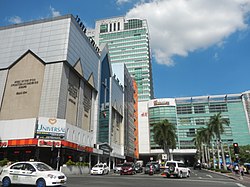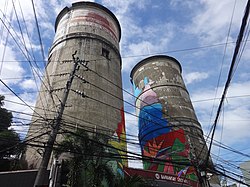Socorro | |
|---|---|
 | |
| Nickname: Cubao | |
 Map showing Socorro in Quezon City | |
 | |
| Coordinates: 14°37′04.3″N121°03′20.7″E / 14.617861°N 121.055750°E | |
| Country | |
| Region | National Capital Region |
| City | Quezon City |
| District | 2nd District |
| Established (as barrio) | November 6, 1961 |
| Declared as barangay | September 21, 1974 |
| Government | |
| • Type | Barangay council |
| • Barangay Captain | Dr. Teodulo "Ted" Santos |
| Area | |
• Total | 115.6968 ha (285.8930 acres) |
| Population (2019) | |
• Total | 25,073 |
| Time zone | UTC+8 (PST) |
| ZIP Code | 1109 |
| Area code | 02 |
Socorro (PSGC: 137404115 Archived July 12, 2018, at the Wayback Machine ) is a barangay located in Quezon City, Philippines, within the commercial district of Cubao. As of the 2019 census, the barangay has a population of 25,073 people. [1] The barangay is home to Araneta City and Smart Araneta Coliseum, one of the largest indoor arenas in the world.








